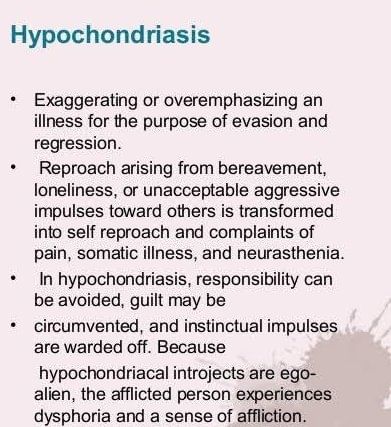What Is Hypochondriasis?
What is Hypochondriasis?
Hypochondriasis is a belief that you have a serious or life-threatening disease even when there is no medical evidence to support the presence of an illness. Hypochondriasis is also called hypochondriasissis.
Symptoms of Hypochondriasis-
- Overwhelming fear of illness
- High levels of anxiety
- Thinking you have a disease after reading or hearing about it
- Misinterpretation of minor physical symptoms
- Frequent doctor visits, switching doctors, or conversely, fear of doctors
- Continuously talking about your symptoms or suspected diseases with family and friends
- Frequently checking your vital signs, such as pulse or blood pressure
Causes of Hypochondriasis-
It’s not clear why some people are overwhelmed that they have a major, undiagnosed health issue.
Risk factors of Hypochondriasis-
- Having close family members with hypochondriasis
- Feeling especially vulnerable to illness or disease
- Having a serious illness during childhood
- Having parents who were neglectful or abusive
- The death of a loved one
- Having an anxiety disorder
Complications of Hypochondriasis-
- Depression
- Anxiety disorders
- Excessive anger and frustration
- Substance abuse
- Relationship difficulties
- Financial problems related to medical costs
- Work or school problems
Diagnosis of Hypochondriasis-
Diagnosis of Hypochondriasis involves the following tests:
- Physical exam
- Psychological evaluation
- Complete blood count (CBC)
- Screening for alcohol and drugs
- Checking your thyroid function
Precautions & Prevention of Hypochondriasis-
There is no sure way to prevent hypochondriasis. Addressing hypochondriasis early can reduce the complications.
Treatment of Hypochondriasis
- Homeopathic Treatment of Hypochondriasis
- Acupuncture & Acupressure Treatment of Hypochondriasis
- Psychotherapy Treatment of Hypochondriasis
- Conventional / Allopathic Treatment of Hypochondriasis
- Surgical Treatment of Hypochondriasis
- Dietary & Herbal Treatment of Hypochondriasis
- Other Treatment of Hypochondriasis
Homeopathic Treatment of Hypochondriasis-
Homeopathic Treatment of Hypochondriasis helps to relieve feelings of anxiety and depression often associated with the disease. Homeopathy gives lasting cure for hypochondriasis as it resolves deeper psychological issues. Some of the homeopathic remedies for treatment of hypochondriasis are:
- Aconitum
- Arsenic album
- Lycopodium
- Nux V
- Phosphorus
- Pulsatilla
Acupuncture & Acupressure Treatment of Hypochondriasis-
Acupuncture Treatment of Hypochondriasis balances the flow of energy (qi) in the body which is helpful for people who have distorted perceptions of normal body sensations. It is useful for relieving ongoing fear and apprehension. It helps in reducing emotional stress and pain. It also improves energy and regulates sleep patterns.
Psychotherapy and Hypnotherapy Treatment of Hypochondriasis-
Psychotherapy and hypnotherapy treatment of Hypochondriasis helps you recognize and stop behavior associated with your anxiety, such as constantly monitoring your body for problems. It helps to deal with their fears. It teaches people to concentrate less on thoughts and fears of illness and to use relaxation and distraction techniques. Hypnotherapy is safe and quick treatment of deep-seated psychological issues and barriers.
Conventional / Allopathic Treatment of Hypochondriasis-
Allopathic Treatment of Hypochondriasis includes the following medications:
- Antidepressant medications – fluoxetine and fluvoxamine
- Tricyclic antidepressants – clomipramine and imipramine
Dietary & Herbal Treatment of Hypochondriasis-
- Eat foods high in B-vitamins and iron, such as whole grains, dark leafy greens and sea vegetables.
- Eat fewer red meats and more lean meats
- Avoid coffee, alcohol, and tobacco
- Drink 6 – 8 glasses of filtered water daily
- Eat small, frequent meals throughout the day.
- Eat antioxidant fruits such as blueberries, cherries, and tomatoes



+1.svg)
